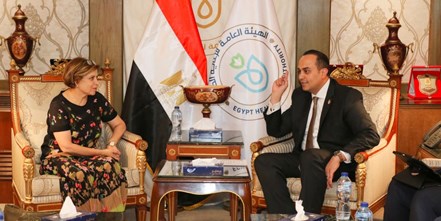



The Chairman of the Egypt Healthcare Authority met with the Regional Director of the World Bank to discuss support for the second phase of the universal health insurance project in five new governorates.
The Chairman of the Egypt Healthcare Authority stated that an agreement was reached to support the projects of the Egypt Healthcare Authority for technological integration of electronic systems, enhancing the revenue cycle management system and clinical governance in the affiliated facilities, and strengthening partnerships with the private sector.
The Chairman of the Egypt Healthcare Authority noted that there has been a significant decrease in health spending from the citizen's pocket, acknowledged by the World Health Organization and the World Bank. He affirmed that efforts are underway to reach global levels in reducing out-of-pocket expenses and achieving financial health protection by 2030, emphasizing that the World Bank is a strategic partner for Egypt in supporting health reform projects.
The Regional Director of the World Bank congratulated Egypt on the success achieved in implementing the universal health insurance system in the first phase, which encourages further support for the upcoming stages of this significant national project.
The Regional Director of the World Bank praised the unique model of implementing an integrated health care system in the governorates covered by the universal health insurance system and requested a careful study to leverage this experience for transferring the model to other countries globally.
The Regional Director of the World Bank noted the integration, professionalism, and quality of services provided by the Egypt Healthcare Authority during their field visit to Ismailia, which exceeded experts' expectations, and stated that the Egyptian model in mechanization and digital health is rapidly evolving.
During the meeting, Dr. Fadia Saadeh, Regional Director for Human Development in the Middle East and North Africa at the World Bank, was received by Dr. Ahmed El-Sobky, Chairman of the Egypt Healthcare Authority and Supervisor General of the universal health insurance and Hayat Kareema projects at the Ministry of Health and Population, at the Authority's main office in Cairo.
Dr. Ahmed El-Sobky reviewed the achievements of the Egypt Healthcare Authority in the six governorates of the first phase of the universal health insurance system—Port Said, Luxor, Ismailia, South Sinai, Aswan, Suez—and the lessons learned from this phase. The meeting also discussed ways to enhance cooperation in supporting the second phase of the universal health insurance project in five new governorates.
Dr. Ahmed El-Sobky mentioned that the agreement during the meeting supported the Authority's projects for technological integration of electronic systems, enhancing the revenue cycle management system, and clinical governance in the affiliated facilities, and strengthening partnerships with the private sector. He noted that the Egyptian experience in health reform and universal health coverage had five main axes for success: governance, clinical governance, sustainability, digital transformation, quality, and patient safety.
Dr. El-Sobky added, "We have achieved a noticeable reduction in health spending from the citizen's pocket, certified by the World Health Organization and the World Bank, and we will diligently work to reach global levels in reducing out-of-pocket expenses and achieving financial health protection by 2030," affirming that the World Bank is a strategic partner for Egypt in supporting health reform projects.
On her part, Dr. Fadia Saadeh, Regional Director of the World Bank, expressed her happiness with the success achieved in implementing the universal health insurance system in the first phase, adding that this encourages the study of providing more support for the upcoming stages of this significant national project.
The Regional Director of the World Bank praised the unique model of implementing an integrated health care system in the governorates covered by the universal health insurance system, requesting a careful study to leverage this experience for transferring the model to other countries globally.
The Regional Director confirmed that the integration, professionalism, and quality of services provided by the Egypt Healthcare Authority, and what she witnessed as an example during her visit to the healthcare facilities in Ismailia, exceeded experts' expectations, confirming that the Egyptian model in mechanization and digital health is rapidly evolving.